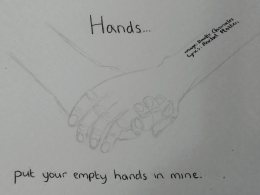I was speaking to a wonderful crisis team nurse this evening, who spent 50 minutes talking to me in a state of heightened distress at the end of a working day that she had started 14 hours earlier; she provided me with all I could have hoped for over the phone. We started with how I was feeling; she coaxed me into taking some medication because I was so distressed that she was struggling to understand me; she waited patiently until I could be a bit more coherent; we talked more about what I was feeling; she asked about my thoughts; we discussed risk levels – she asked about recent self harm and what my thoughts and likelihood of acting again or more drastically were; she was patient, kind and compassionate; she got me to talk more honestly than anyone but my trusted care coordinator has been able to. Then, in the last few minutes of our conversation, as she apologised that she had to say goodbye because she had to give handover to the next shift, she suggested that we make a plan for the next few hours. She suggested I snuggle up in my PJs, with my kitten and a hot drink, and watch a film that she knew I found calming – then she panicked and quickly apologised, and I felt immensely guilty. You see, this is because she knows how unhelpful I find the bog-standard ‘brew and bath’ cure that all crisis teams seem to trot out as the miracle solution to any problem. So, she started to justify why she had suggested that, repeatedly correcting herself, and I found myself realising that those staff that do go about things correctly maybe don’t really understand the troubling way that other staff go about things, and so the generalisations affect those professionals as well as the patients – because I feel that her suggestion in that context was entirely appropriate and not in the slightest way minimising my pain or dismissing it as something a bit of easy self-soothing would cure.
This dichotomy actually can be demonstrated perfectly in the two calls I had with the team today. The one above, this evening, truly was all that one could hope for when seeking help over the phone in a crisis – comprehensive, caring, getting a full picture over a suitable amount of time and offering psychological/emotional support as well as ending on some practical suggestions. The one during the afternoon – also with a qualified mental health nurse who knows me – lasted 3 minutes, involved no questioning of how I felt or why I was in such intense distress, and I was simply told “You have to keep trying. Just go away and distract yourself.”…that was it. Now, that, is entirely unhelpful and not addressing my health or wellbeing in any way. She didn’t even know what I was feeling other than being able to “hear how hard things are today” – but without any attempt to ask me anything, talk to me for even a little bit, find out about risk, ask about my thoughts, or provide me with any psychological/emotional support, I was sent away with a pat on the head and the treatment plan of a toddler with the sniffles.
You see, in this case, the context is key. It wasn’t until today that I realised that those skilled nurses who I’ve discussed this with hadn’t necessarily realised that the issue is when ‘brew and bath’ is offered as the entirety of the conversation – that they might be feeling guilty for when they use it at the end of a conversation, in a more appropriate scenario when all other avenues have been explored. The nurse this evening just wanted to try to keep me occupied and safe for a few hours – not expecting me to feel better after it, but hoping that (because we’d formed the plan together and I’d promised her that I’d try) I might be able to stick to that – the one this afternoon…well, I don’t know what her thought process was and I don’t want to guess! She’s a nice person, I’m not doubting that, however I do not believe that the way that call was handled was in any way appropriate (and I know this goes on all over the place, all the time). But I can tell you that all the baths and brews in the world won’t solve a mental health crisis without appropriate treatment and support – especially if the mental health professional fails to even find out how you’re feeling or what you’re thinking before sending you on your merry way.
With mental health (as with much of life!), it’s the context that’s key.
